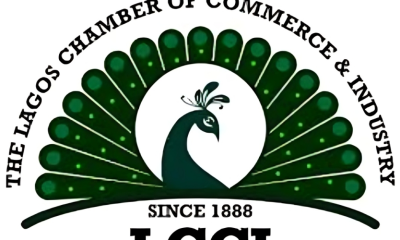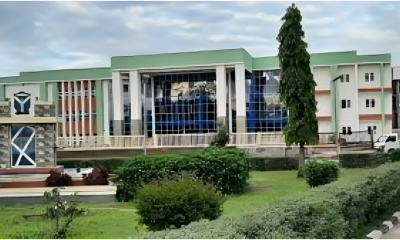Health
18,000 Suspected Cases of Mpox Reported in DRC–WHO

The Director-General of WHO, Dr Tedros Ghebreyesus, says more than 18,000 suspected cases of Mpox have been reported in the Democratic Republic of Congo(DRC) this year, with 629 deaths.Ghebreyesus disclosed this on Friday during an online news conference.He said that the cases included more than 5000 cases and 31 deaths from the eastern provinces of North and South Kivu, where the new clade 1b strain had been spreading.
“The number of reported cases of clade 1b has been rising rapidly for several weeks. “Fortunately, relatively few deaths have been reported in recent weeks.’’According to him, in addition, 258 cases of clade 1b have been confirmed in Burundi, four in Rwanda, four in Uganda, one in Kenya and one each in Sweden and Thailand.“We also remain concerned about outbreaks of clade 1a in other parts of DRC.“This morning, I returned from DRC, where yesterday I had the honour to meet with His Excellency President Félix Tshisekedi to discuss the outbreaks.“I thanked the president for his leadership in the response to the outbreaks, demonstrated by the government’s commitment of 10 dollars to the response.I assured him of WHO’s full support, together with the Africa CDC and other partners.’’Ghebreyesus said he also had the opportunity to meet with the UN Country Team, where they discussed coordination of the Mpox response among UN agencies, under the government’s leadership.He that they discussed the critical importance of clear communication with people at risk of Mpox and strong engagement with communities and local partners.“I also met with global and local health partners to discuss scaling up routine immunisation for other diseases, including polio, measles and malaria, and mobilising frontline polio workers to support the Mpox response.“WHO is working to accelerate access to and delivery of vaccines.“The manufacturers of the two vaccines submitted their applications for emergency use listing last Friday and we are working to review those applications as fast as possible.“The safety and efficacy of vaccines are our highest priority. We will not take short cuts.’’According to him, the two main buyers of vaccines for low-income countries, Gavi and UNICEF, require WHO emergency use listing to buy vaccines for use in countries that have not issued their own national regulatory approval.“Last week, I gave Gavi and UNICEF the green light to proceed with procuring vaccines, in parallel with the EUL process.“However, WHO emergency use listing is not a barrier to vaccines being deployed in DRC.’’The director-general said that DRC’s medicines regulator approved both vaccines in June and the government had requested bilateral donations of vaccines from high-income countries with large stockpiles.He said that together with the Africa CDC, WHO had also helped to secure donations from the European Union and some of its Member States.“WHO is working with the Africa CDC, GAVI, UNICEF, CEPI and HERA to set up a coordination mechanism to allocate the donated vaccines and increase access in affected countries.“On Thursday, we also invited manufacturers of Mpox diagnostics to submit an expression of interest for emergency use listing.’’The WHO boss said that on Friday, the first expression of interest was received.“Over the past two days, we have also convened a meeting of researchers to identify research priorities and to foster a coordinated and collaborative approach to the development of vaccines, diagnostics and therapeutics.“It is vital to stress that although vaccines are a powerful tool, they are far from the only tool.“There are many things that WHO and our partners are doing to prevent and diagnose infections and treat the sick.’’According to him, the outbreak of clade 1b Mpox is occurring in one of the poorest and most insecure regions of DRC, complicating the response.“Despite these challenges, hundreds of WHO personnel are on the ground in DRC and the other affected countries, working with our partners to stop transmission and bring these outbreaks under control.“With the government’s leadership and close cooperation between partners, we believe we can stop these outbreaks in the next six months.“But what this region of DRC needs more than anything else is a political solution to the long-running insecurity,” Ghebreyesus said.(NAN)Health
Teaching Hospital Performs 2nd Kidney Transplant in Maiduguri

The University of Maiduguri Teaching Hospital (UMTH), has successfully performed its second living-donor kidney transplant, 15 years after its first living-donor kidney transplant
The Chief Medical Director (CMD) of the UMTH, Prof. Ahmed Ahidjo, made this known at a news conference on Wednesday in Maiduguri.
“This is not the first time UMTH is doing the transplant.
The first time UMTH conducted a kidney transplant was in August 2010 and now the hospital has come back with full force to resume the excercise,” he said.Ahidjo also announced that the already 20 patients were admitted awaiting surgery on the same kidney transplant.
He appealed to donors to contribute funds to support the have not patients who needed the surgery so dearly.
The CMD said that though, the hospital provided free services being a federal government facility, adding that the patient’s dialysis had been subsidised by the government by reducing everything to N12,000 which was less than eight dollars compared with 1,000 dollars charged for same dialysis elsewhere.
Ahidjo said that the target was to make transplant one of the cheapest in West Africa, saying their facility was largest in the country with a capacity to accommodate up to 85 patients at once.
“UMTH has four fully equipped theatre rooms. All for kidney transplant which were fully equipped with modern equipment,” the CMD said.
He, however, commended TETFUND for its support to the hospital in terms of equipment and other infrastructure.
Ahidjo also commended Gov. Babagana Zulum of Borno for donating N50 million to the hospital to carry out research on causes of kidney related diseases in the North-east.
The CMD said that some of the research findings revealed that diabetics, hypertension and dehydration were linked with the kidney related diseases in the region.
“The causes of kidney issues for now are diabetics, highpertension and exact causes are not yet known but many samples were taken to laboratories and the result is awaited,” Ahidjo said. (NAN)
Health
WHO Declares Mpox Public Health Emergency Concern

The World Health Organisation (WHO), says said the Mpox upsurge has continued to meet the criteria of a Public Health Emergency of International Concern (PHEIC) set forth in the International Health Regulations (IHR).
Dr Tedros Ghebreyesus, WHO Director-General said this in a statement.
Ghebreyesus said the announcement followed the fourth meeting of the IHR emergency committee regarding the upsurge of mpox, held on June 5.
According to him, the committee, recognising progress in the capacity to respond in certain countries, advised the WHO boss that the event continues to constitute a PHEIC.
He said that it was based on the continuing rise in number of cases, including a recent increase in West Africa, and likely ongoing undetected transmission in some countries beyond the African continent
“Ongoing operational challenges in responding to the event, including concerning surveillance and diagnostics, as well as a lack of funding, make prioritising response interventions challenging and require continued international support,” he said.
Ghebreyesus concurred with the committee’s advice and issued the committee’s revised temporary recommendations to Member States experiencing mpox outbreaks.
He said the recommendations will guide countries’ efforts to prevent and control spread of the disease.
According to him, the full report of the fourth meeting will be issued in the third week of June.
“The upsurge of mpox in the Democratic Republic of the Congo and its spread to neighbouring countries was first determined to be PHEIC by Ghebreyesus on Aug. 14, 2024.
“Since then, the committee has met on three additional occasions, each time, advising the director general that the event continues to constitute a PHEIC,” he said (NAN)
Health
First Lady, Remi Tinubu, Distributes 10,000 Professional kits to Midwives in South-East

Nigeria’s First Lady, Sen. Oluremi Tinubu, on Monday in Enugu, distributed 10,000 Professional Kits for midwives in South-East aimed improving healthcare delivery in the zone.
Flagging-Off the programme during her two-day official visit to Enugu State , the president’s wife said the distribution were for midwives in the Southeast States of Abia, Anambra, Ebonyi Enugu and Imo.
According to her, the event is to complement the ongoing Federal Government retraining of health workers to improve healthcare of Nigerians.
The programme was part of her Renewed Hope Initiative (RHI) aimed at improving the healthcare of Nigerians especially the vulnerable groups.
She said, “This is a training for 120,000 frontline health workers nationwide.
I have been told that 60,470 health workers have already completed their training.“In view of this, RHI procured 60,000 branded scrubs and 60,000 pairs of crocs as an incentive to encourage health workers”.
She added that, “Since the initial launch of RHI in January 2025, we have distributed 50,000 scrubs and pairs of crocs to five geopolitical zones, namely North Central, North East, North West, South South and the Southwest.
“Today, we are in Enugu to distribute the remaining 10,000, each of the crocs and scrubs”.
She explained that the donation towards it had been made possible through the general support of Anonymous Global Partners, dedicated towards achieving health outcomes for Nigeria citizens.
The first lady said that the donors were committed to supporting the Organisation of the African First Ladies for Development and the health sector in Nigeria and across the world with a specific focus on reducing infant and maternal mortality and morbidity.
“Tuesday by the grace of God, I will be launching the “Free to Shine Triple Elimination Campaign” for HIV, AIDS, Syphilis and Hepatitis B in Enugu.
“This initiative aims to promote healthier mothers, reduce new HIV infections amongst mothers of reproductive age.
“ It will also eliminate mothers through child transmission of HIV, AIDS, which is the vertical transmission and provide treatment for children born with HIV,” Tinubu said.
She said the RHI would be presenting an additional grant of N50 million to the First Lady of Enugu State, with a sum of N50,000 each to 1,000 women petty traders in Enugu State to recapitalize their existing businesses.
In her welcome address, the Wife of Enugu Governor, Mrs Nkechinyere Mbah, appreciated Tinubu for her commitment in building an inclusive society through RHI.
She said the initiative had significantly impacted countless lives across the nation’s diverse geopolitical zones.
“Your noble endeavour has brought succour and hope to communities that have long yearned for such intervention. Here in Enugu State, we are profoundly grateful for the transformative outcomes of RHI.
“Midwives are at the frontiers of maternal and child health. Empowering these important healthcare workers is crucial to the push to reduce maternal and under- five mortality rates radically,” Mbah said.
Tinubu also inaugurated the state-of-the-art Technical, Vocational Education, and Training College (GTC), Enugu.(NAN)




















